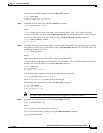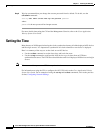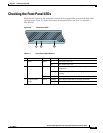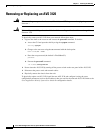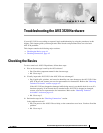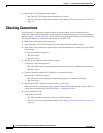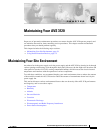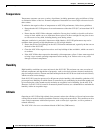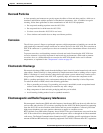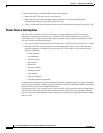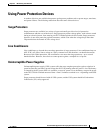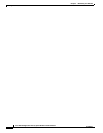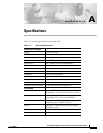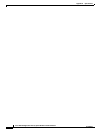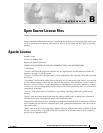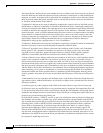
5-3
Cisco AVS 3120 Application Velocity System Hardware Installation Guide
OL-11805-01
Chapter 5 Maintaining Your AVS 3120
Maintaining Your Site Environment
Dust and Particles
A clean operating environment can greatly negate the effects of dust and other particles, which act as
insulators and interfere with the operation of mechanical components. Also, in addition to regular
cleaning, follow these guidelines to deter contamination of the AVS 3120 equipment:
• Do not permit smoking anywhere near the AVS 3120.
• Do not permit food or drink near the AVS 3120.
• Use dust covers when the AVS 3120 is not in use.
• Close windows and outside doors to keep out airborne particles.
Corrosion
The oil from a person’s fingers or prolonged exposure to high temperature or humidity can corrode the
gold-plated edge connectors and pin connectors on various devices in the AVS 3120. This corrosion on
AVS 3120 connectors is a gradual process that can eventually lead to intermittent failures of electrical
circuits.
To prevent corrosion, avoid touching contacts on boards and cards. Protecting the AVS 3120 from
corrosive elements is especially important in moist and salty environments, which tend to promote
corrosion. Also, as a further deterrent to corrosion, the AVS 3120 should not be used in extreme
temperatures, as explained in the “Temperature” section on page 5-2.
Electrostatic Discharge
Electrostatic discharge (ESD) results from the buildup of static electricity on the human body and certain
other objects. Static electricity is often produced by simple movements such as walking across a carpet.
ESD is a discharge of a static electrical charge that occurs when a person whose body contains such a
charge touches a component in the AVS 3120, especially chips, and causes the component to fail.
ESD is a problem particularly in dry environments where the relative humidity is below 50 percent.
To reduce the effects of ESD, observe the following guidelines:
• Wear a grounding wrist strap. If a grounding wrist strap is unavailable, touch an unpainted metal
surface on the chassis periodically to neutralize any static charge.
• Keep components in their antistatic packaging until they are installed.
• Avoid wearing clothing made of wool or synthetic materials.
Electromagnetic and Radio Frequency Interference
Electromagnetic interference (EMI) and radio frequency interference (RFI) can adversely affect devices
such as radio and television (TV) receivers operating near the AVS 3120. Radio frequencies emanating
from the AVS 3120 can also interfere with cordless and low-power telephones. Conversely, RFI from
high-power telephones can cause spurious characters to appear on a monitor screen.
RFI is defined as any EMI with a frequency above 10 kHz. This type of interference can travel from the
AVS 3120 to other devices through the power cable and power source or through the air like transmitted
radio waves. The Federal Communications Commission (FCC) publishes specific regulations to limit the
amount of EMI and RFI emitted by computing equipment. Each AVS 3120 meets these FCC regulations.



